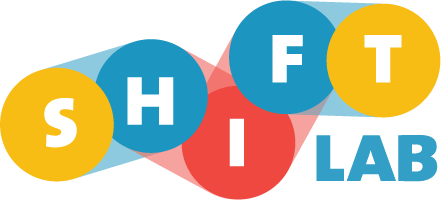Introducing the Shift Lab: Pieter de Vos
Curious about the folks who are participating in the Shift Lab? Wonder no more! Over the next three weeks, we will feature each of the Core lab team members (12 in all) as they tell us their thoughts about social innovation, racism and poverty in Edmonton, and why they joined the Shift Lab. Yesterday, we met Vanessa. Today, meet Pieter de Vos. You can also check out Pieter's bio here.
So why am I interested in exploring the intersection of poverty and racism?
The is a tricky question. Where do I start? I guess my “entanglements” is the simplest answer.
I am reminded of the words of the Indigenous scholar John Borrows when he writes:
“To be alive is to be entangled in relationships not entirely of our own making…We receive languages, cultures, and worldviews before getting much choice in the matter. Our formative years are threaded with social, emotional and economic relationships which we did not conceive. They are woven into our very being, largely without our permission. We are structured by race, class and gender without much ability to resist, at least at first…”
In my case, my primary entanglement comes from being born in South Africa — a country where issues of race and reconciliation have been central and ongoing. My ancestry traces back to the first Dutch settlers who colonized the country in the 1650s. My family story is enmeshed with the political and social threads that have shaped the country: the rise and eventual resistance to Afrikaner nationalism; the emergence and subsequent rejection of apartheid; the embrace of the heartaches and hopeful promises of a post-racial country.
In short, my family story has oriented me to addressing poverty and racism. My complicated history reminds me of my human imperfections and my obligations to continually strive for a world where social justice and human rights are upheld – and this includes engaging courageously in my messy backyard in Edmonton.
Why a social innovation lab?“
Entanglements” is also the simplest answer. In my experience, social innovation labs create the space to make sense of social realities and to explore solutions that honour both human experience and complexity. In many ways, we are all implicated in systems that create and recreate both the opportunities and the challenges in our world. Our entanglements can be liberating or oppressive. Social innovation labs create the conditions where diverse ways of knowing can be interwoven to create new ways of relating and acting in the world. As John Borrows says:
“Our entwined languages, cultures and worldviews can also generate innovation and creativity. Conflicting, contrasting, parallel and mutually reinforcing life-ways can present alternatives for taking new actions. Their combinations and permutations can sometimes provide unexpectedly positive opportunities. Habits, customs, routines and conventions can be turned upside down, for good as well as for ill….”
I am optimistic that the Shift Lab will facilitate these types of transformations. I look forward to the journey and to the positive changes we might catalyze to address poverty and racism in Edmonton.
Citation
John Borrows, “Foreword,” Entangled Territorialities: Indigenous Peoples from Canada and Australia in the 21st Century at 6 [forthcoming].
